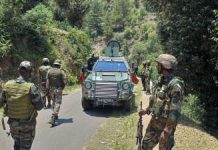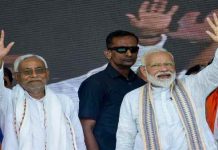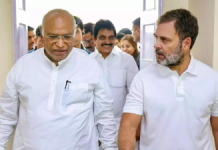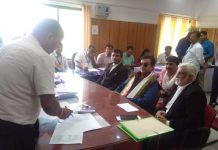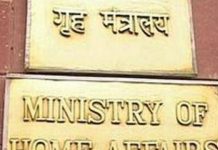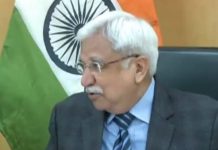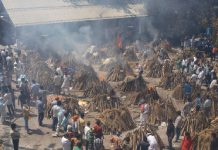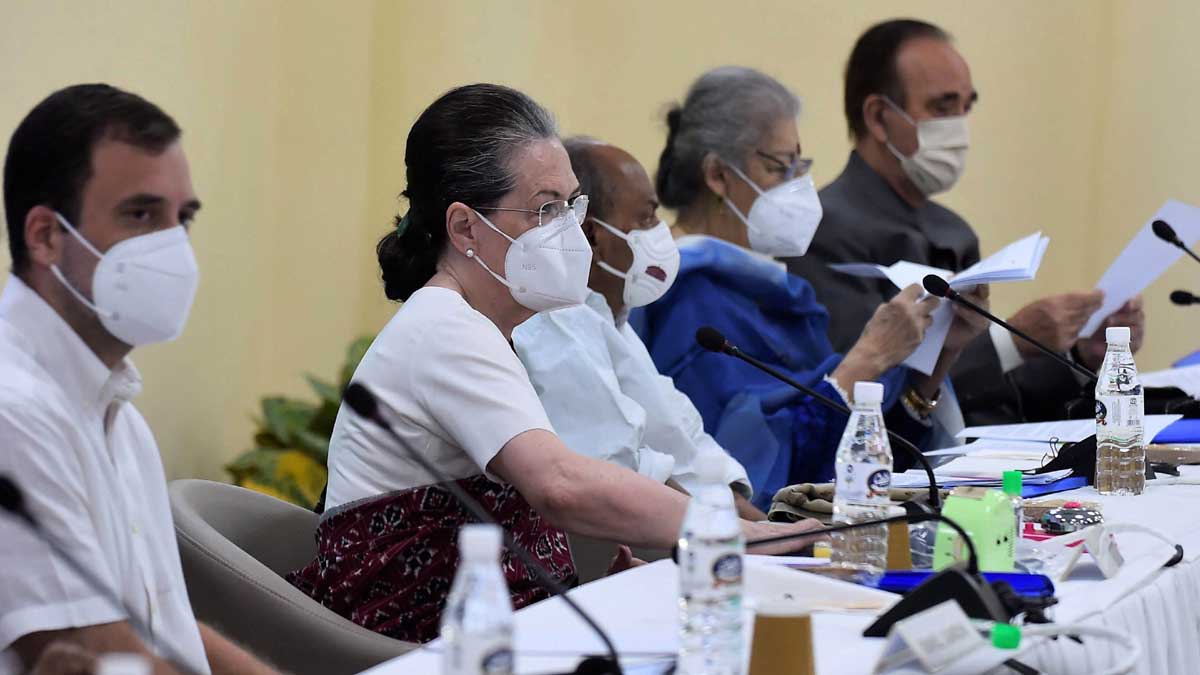
The decision to hold internal party polls, which will culminate with the election of party chief, was taken during the October 16 CWC meeting. The schedule for the democratic exercise was finalised, ending months of speculation over the issue. A report by Amit Agnihotri
The Congress will have a full-time, elected party president by September 2022. The decision to hold internal polls, which will culminate with the election of party chief, was taken during the October 16 Congress Working Committee meeting, which finalized the schedule for the democratic exercise, ending months of speculation over the issue.
The leadership issue had been discussed within the party circles since the 2019 Lok Sabha elections in which the Congress could win only 52/543 seats, up marginally from 44/543 in the 2014 Lok Sabha polls.
Rahul Gandhi, who had become party chief in 2017 through an election process, had resigned in May 2019, owning responsibility for the party’s debacle in the national elections.
Rahul, who had taken over the reins of the party from his mother Sonia Gandhi, who headed the organization from 1998-2017, had asked the party veterans not to appoint any member of his family as the new party chief. Instead, he wanted them to find someone from outside the Gandhi family.
However, after exploring the various options, the veterans finally urged Sonia to come back as interim chief as Rahul had refused to withdraw his resignation.
This was a short-term arrangement and the party managers hoped to have a full-time president soon but the issue could not be finalized and led to much speculation within the organization.
As the party suffered a series of setbacks in states, a group of seniors, who later came to be known as the G-23, became worried and wrote a dissent letter to Sonia urging her to carry out a complete overhaul of the party and have elected heads, right from the post of district chiefs to that of the Congress president.
This, the veterans argued, was needed to strengthen the organization and make the Congress fighting fit to take on the ruling BJP.
A full-time president, they said, was also needed so that the Congress could lead the opposition parties and forge a larger national anti-BJP front ahead of the 2024 Lok Sabha polls.
However, the Gandhi family loyalists saw the demands of the G-23 as a sort of rebellion against the party’s interim chief and slammed the veterans at various party forums and outside.
While most of 2020 was lost to the Covid-19 pandemic, the party had prepared a schedule for internal polls in January 2021 but the plan had to be deferred to June due to the assembly elections in Assam, West Bengal, Kerala, Tamil Nadu and Puducherry in April.
The internal polls were again deferred in May due to the raging second wave of the pandemic. However, a poor show in the April state polls and serious infighting in the Punjab, Rajasthan and Chhattisgarh units, gave yet another opportunity to the G-23 to raise the leadership issue again.
Before that, a prominent G-23 member, Kapil Sibal had hosted a meeting of opposition leaders to discuss how the Congress could be revived and an anti-BJP front formed.
The Gandhis were not invited to the gathering. Later, Sonia held a separate online conclave with key opposition leaders, where she urged them to give up political compulsions and work unitedly to take on the saffron party.
Sonia had been taking note of the moves being made by the dissenters and then decided to settle the leadership issue once and for all.
“I am, if you will allow me to say so, a full-time and hands-on Congress President. In the last two years, a large number of our colleagues, particularly the younger ones have taken on leadership roles in taking party policies and programmes to the people — whether it be the agitation of farmers, provision of relief during the pandemic, highlighting issues of concern to youth and women, atrocities on Dalits, Adivasis and minorities, price rise, and the destruction of the public sector,” Sonia said at the CWC meet.
Asserting that the interest of the party was paramount, Sonia said: “The entire organization wants a revival of the Congress. But this requires unity and keeping the party’s interest paramount. Above all, it requires self-control and discipline. I am acutely conscious of the fact that I have been interim Congress President ever since the CWC asked me to return in this capacity in 2019.”
She also cautioned the dissenters, saying, “Never have we let issues of public importance and concern go unaddressed. You are aware that I have been taking them up with the Prime Minister as have Dr Manmohan Singh and Rahul ji. I have been interacting with like-minded political parties regularly. We have issued joint statements on national issues and coordinated our strategy in Parliament as well. I have always appreciated frankness. There is no need to speak to me through the media.”
G-23
Till the internal polls are over, the G-23 will be expected to ensure the party scores well in the coming assembly polls in Uttar Pradesh, Uttarakhand, Punjab, Goa and Manipur early 2022.
These polls are crucial for the Congress trying to assert itself as an anchor and forge opposition unity ahead of the 2024 national elections.
Unfortunately, the party did not do well in the recent round of assembly polls in West Bengal, Assam, Kerala, Tamil Nadu and Puducherry and the G-23 could easily raise questions about decision-making.
This won’t be possible for the coming contests though, in terms of decision-making, nothing would have changed. Sonia will remain in charge as interim chief while her children Rahul and Priyanka would call the shots.
Yet, the role played by the G-23 members, including the comments that they make, would come under sharper scrutiny of the Gandhi family loyalists.
Over the coming weeks, the party may give important roles to the G-23, who are all seasoned politicians and have faced many electoral contests.
Rahul once more
There is a buzz that Rahul, who is the de facto Congress president as he is taking all the key decisions, may return to the top party post.
Though his critics claim Rahul is reluctant to take over again, his close aides say the leader wants his promotion to happen through an election route rather than a nomination.
An election process gives credibility to the person occupying the top party post, something which a nomination cannot.
Several members of the CWC urged Rahul to take over again as party chief to which the leader said he will consider their proposal.
Interestingly, the past few weeks have seen unanimous resolutions passed by the party’s youth wings in favour of Rahul as the next party president but a more humane appeal has come from Karnataka leaders K Siddaramaiah and DK Shiv Kumar, who have cited Sonia Gandhi’s ill health as the reason to promote Rahul.
Besides being the de facto party chief, Rahul has also been leading the party in Parliament and heading poll campaigns in the past. He has also been active in coordinating with the other like-minded parties in forging a bigger anti-BJP front ahead of the 2024 national polls.
Of late, there have been discussions around a new Rahul-Priyanka style of leadership combo which was taking controversial yet bold decisions.
A combo leadership option may be good for strategy sessions but for the sake of an official charge, only one person can hold the post of party chief.
Over the past years, Rahul has been trying to bring in more younger leaders into the party fold and giving them key roles to prepare for the future.
He has also been open in welcoming Left leader Kanhaiya Kumar and Dalit activist Jignesh Mewani to counter the charge that the party was losing young leaders who saw no future for themselves in the grand old party.
Priyanka is trying hard to revive the party in UP, a big challenge in itself and generally campaigns across the country.
CWC resolutions
The Congress Working Committee said it was deeply distressed to note the multiple challenges that face the country and the all-round failure of the Modi government in dealing with them.
The panel noted that despite multiple rounds of talks, China has not vacated Indian territory; nor has government been able to recover old positions. The aggressive posture of China and the unabated infiltrations by Pakistan have resulted in a dramatic deterioration of the security situation in Jammu and Kashmir.
The panel said inter-state disputes between Assam, Nagaland and Mizoram have flared up suddenly driving fear in the minds of the people living in the border villages while the Naga peace talks have suffered a serious setback due to the ham-handed approach of the central government.
The panel said that agitation by farmers against the three laws on agriculture continues even after 10 months. Further, the tragic incident at Lakhimpur Kheri was a clear example of official support to the attempt to suppress the voice of the farmers, the panel said. The refusal of the Prime Minister to condemn the brutal murder of the farmers and to sack the Minister of State for Home Affairs have shocked the conscience of the country, the panel noted.
The CWC also noted the unbridled and unchecked state sponsored attacks on Scheduled Castes, Scheduled Tribes, minorities and women, in order to intimidate them and deny them their rights and said the Congress will fight all such lumpen elements courageously and decisively and defend the rights of all citizens.
The panel expressed concern on continued slide in the economy was a matter of great concern, the panel noted, saying millions of families face the twin hardships of unemployment and high prices.
The country’s financial situation was in a terrible shape, the panel noted, adding that the Modi government had no compunction in running the government on revenues raised through crushing taxes imposed on petrol and diesel.
In order to hide the precarious state of its finances, the government had launched a fire sale of the assets built in this country over 70 years. It was widely believed that the most valuable among these assets in ports, airports, petroleum, power and telecommunications will be sold to select business houses that are cronies of the government, the panel added.
Internal poll schedule
The enrolment of Congress members will take place from November 1, 2021 to March 31, 2022. District Congress Committees will publish preliminary list of members together with the list of eligible contestants for participation in the election enrolled up to March 31. This list will be published before April 15, 2022.
Election of President and Executive of Primary Committees and Block Committees, and Election of Block Presidents and Executive Committees and one member of the PCC by Block Congress Committee will be held from April 16, 2022 to May 31, 2022.
Election of President, Vice President, Treasurer and Executive Committee of DCC will be held from June 1, 2022 to July 20, 2022.
Election of PCC President, Vice President, Treasure and PCC Executive and AICC Members, by the PCC general body will take place from July 21, 2022 to August 20, 2022.
Election of the AICC President will be held from August 21, 2022 to September 20, 2022.

